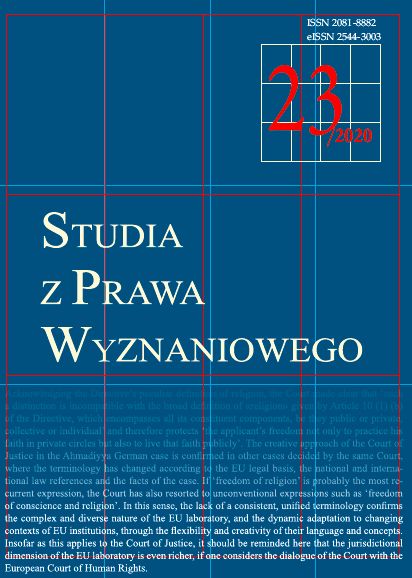Prawne aspekty rozwoju turystyki pielgrzymkowej w Polsce w latach 1918-1939
Legal Aspects of the Development of Pilgrimage Tourism in Poland between 1918 and 1939
Author(s): Leszek ĆwikłaSubject(s): Law, Constitution, Jurisprudence, History of Law, Constitutional Law, Civil Law, Human Rights and Humanitarian Law, Canon Law / Church Law
Published by: Katolicki Uniwersytet Lubelski Jana Pawła II - Wydział Prawa, Prawa Kanonicznego i Administracji
Keywords: pilgrimages; tourism; Constitution of the Republic of Poland; legislation on religion; freedom of worship;freedom of conscience and religion;turystyka; pielgrzymki; wolność kultu;
Summary/Abstract: In the Second Republic of Poland, an important religious, cultural and socio-economic phenomenon was – as it is today – pilgrimage tourism. The author’s intention was to analyze the laws in force at that time and to answer the question whether the state legislation had a positive impact on the development of this type of tourism. The basic normative acts in this respect were the Constitution of March and the Constitution of April, whose provisions guaranteed, among others, the freedom of worship to citizens, and religious organizations, recognized by the state, the right to hold collective and public services. When it comes to ordinary legislation, the provisions of the 1932 Criminal Code, the 1932 Law on Assemblies and the provisions relating to time off from work (establishing holidays and introducing the institution of rest leave) were analyzed. Attention was also drawn to the draft of the “Tourism Act”, which contained regulations affecting the development of pilgrimage tourism. Next, the paper focuses on the legal acts issued by the Minister of Communication, providing concessions for pilgrims travelling by train, and on the legal acts issued by other bodies, containing regulations for pilgrims going abroad or coming from abroad to Poland. After the analysis of the legal regulations, it was concluded that the actions of the state authorities, recognizing the important role of religion in the functioning of the state and society, favored the development of pilgrimage tourism. The regulations did not provide for restrictions which resulted in the practice of such tourism without restraint.
Journal: Studia z Prawa Wyznaniowego
- Issue Year: 2020
- Issue No: 23
- Page Range: 223-244
- Page Count: 22
- Language: Polish

